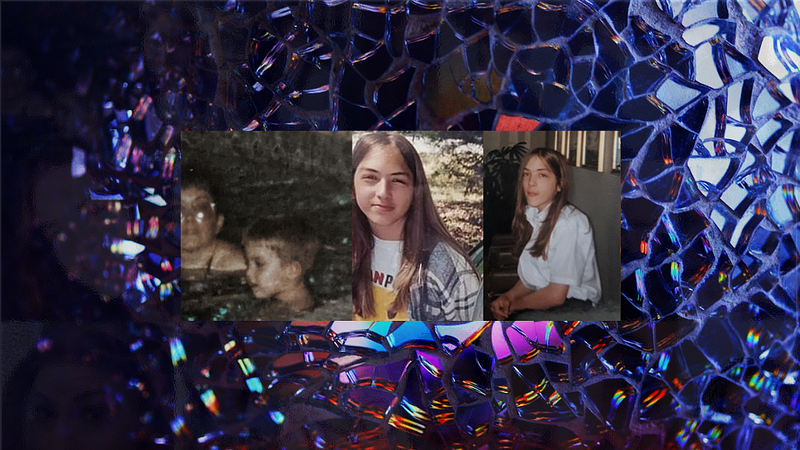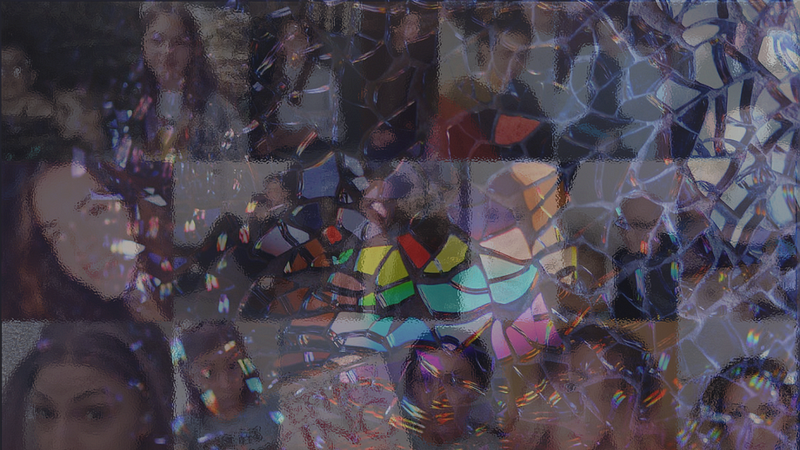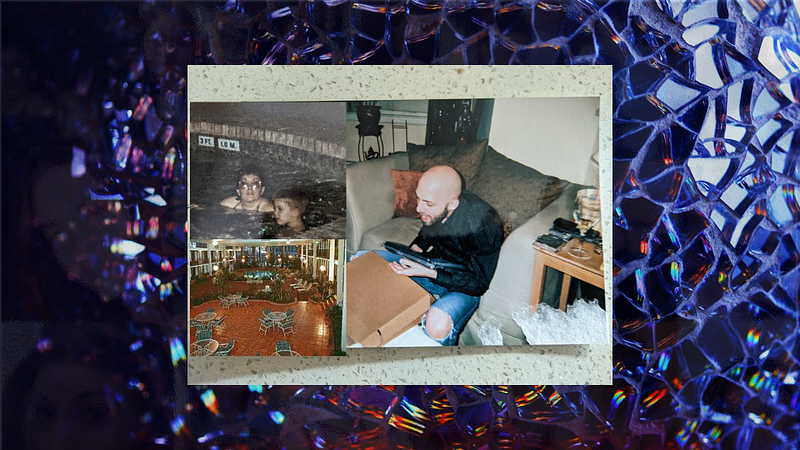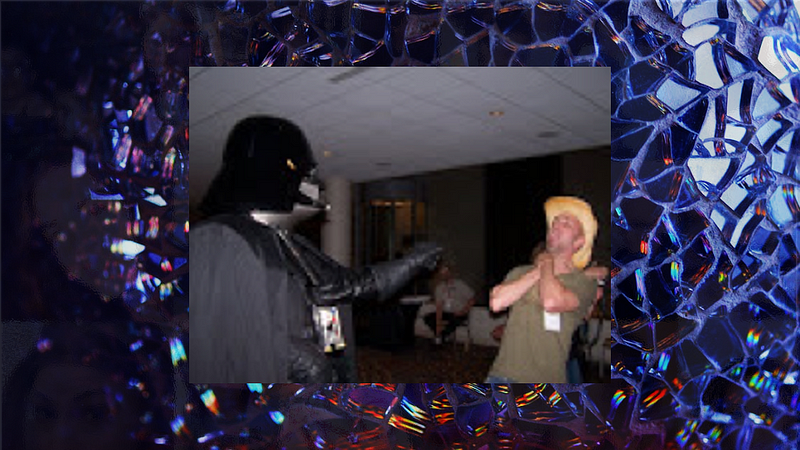My Life With Dissociative Identity Disorder
| Mississippi | 1990s | Gender Conversion Therapy | DID |
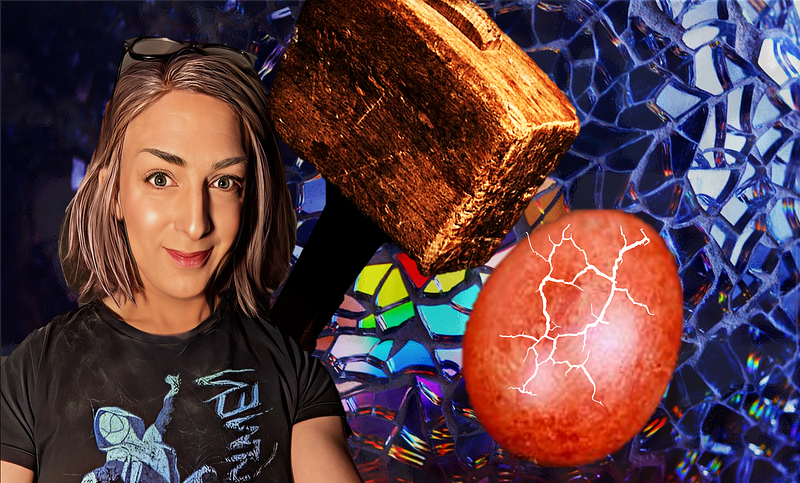
CW: transphobia, disordered eating, SA, hospitalization
Starvation is a powerful tool. It’s almost supernatural.
It can be used to force all kinds of things to happen to yourself, to others, to the world around you. But that power is a trap.
For me, starvation was a hammer and my body was the nail. With each hit, I shattered into smaller pieces. The further I shrank, the less there was of me to save. And with each diminished part, so went the rest.
Brené Brown, famed expert and social science researcher on shame and vulnerability, noted that if you numb one emotion, you numb all of them. There’s simply no way to kill our connection to sadness without also destroying our connection to joy.
She said, “When we numb the painful emotions, we also numb the positive ones.”
In the same way, the memories I needed to forget took with them the memories I would have liked to have held on to. I felt empty because emptiness was better than being filled with the memory of what my family had done.
I’ve lived in terror for years. Decades. Terrified what remembering would bring.
It’s hard to accept just how much I’ve forgotten. How much I CHOSE to forget. How much I had to forget if I wanted to survive.
And with those memories went the truest parts of who I am.
But here I come. One at a time. Each part of me remembering what was hidden and what was lost. Because with each reclaimed memory comes a bigger part of the story. The one I’ve been afraid to see for too long.
A secret about my past that could change everything I thought was true.
How to Have an Epiphany
Epiphanies hit you when you least expect them. Mine came as I was walking with my family to our car. We were coming from the 99 Cent Store, one of the most treasured places a kid could go.
Everything was, well, 99 cents (or less!). Our family was so poor that we often lost our electricity and got groceries from a food pantry. Going to the 99 Cent Store with even $1 made me feel like royalty.
We didn’t have much money. We sometimes didn’t even have electricity. We got evicted when we couldn’t pay the rent — but for $1, you could take home a bounty of joy, each piece separate and savored.
In the season 1 finale of Mad Men, Don Draper told a story about how every time he ate a Hershey bar, he felt like he was home. Just like him, I loved Hershey bars. I also loved Milky Ways. Three Musketeers. Whatchamacalits (that’s their real name).
But the truth of that memory falls apart as fast as Don’s story. Hershey bars didn’t make me feel as though I was home — they just helped me ignore what was happening inside my actual house.
My parents had always been addicts, but now they were deep into an end-of-days cult. They promised me the world was going to end, and it would happen so soon that I didn’t need to fear death.
God had promised His swift return, and while we didn’t know the exact hour of that moment, the scriptures — interpreted by my father — provided enough warning that we could save ourselves.
We were supposed to be the lucky ones.
When I died, I would go to heaven with my parents — but only if I kept their secrets. Only if I agreed that as long as no one outside our family knew what the men in my family did to the women, no one could tell God a different story.
On the day the sky opened and God came down and took all of the worthy souls to heaven, He would take my family. He would take my father. He would take my mother. He would take my sister. He would take my twin brother.
And as long as I stopped talking, He would take me too.
But only if I became silent. Quiet. Hidden.
On that day outside the 99 Cent Store, I became convinced that the only way to feel safe — because actual safety would never be possible again — was to starve myself into invisibility.
How to Become Invisible
I hid my shrinking body under sweatshirts, but then my my mom noticed.
She sat me down at the kitchen table and made me a simple meal from simple ingredients. She mashed up the refried beans, mixed them with cheese, wrapped them in a tortilla, and heated up the concoction in a microwave.
She did all this with great ceremony. Food had turned out to be a kind of comfort for her darkest days, too. The things that happened to her as a little girl were no better than what happened to me.
For my mom and me, her obtrusively queer daughter, food was a way for us to hold our own communion. We transformed our pain into something pure.
But that day was different. That day, I wouldn’t touch it.
My mom moved to the corner of the kitchen. My dad sat at the table. He pushed the food at me. He glared at me. He waited for me to eat. He told me to pick it up and put it in my mouth. His lips began to tremble.
His concern was real. It always is with violent men blinded by their good intentions.
He slammed his hands on the table. His face got red. He screamed.
But I wouldn’t eat. The men in my family were doing things to the women I still don’t understand — a part of me just doesn’t want to. They touched me, my sister, my mom.
I had to get sick. I believed if I did, they’d leave me alone.
But they didn’t stop.
They kept touching me, only now it was to cleanse me of whatever demon had made me sick. I found out their touch wasn’t just about sex. It was about power. It was about God’s glory. It was about them feeling like God saw no difference between the three.
Each man, my dad said, was God’s chosen leader. A vessel for the Holy Spirit. As the head of our household, our father said for us to see him as no different than God. What empowered our father would empower Our Father.
Telling him to stop, he said, was the same as disobeying God.
If they wouldn’t stop touching me, then I would leave nothing for them to touch. I got sicker. I got thinner. I got quieter.
Our family doctor warned my parents that at this low weight, their poor little girl could die — until finally they had no choice but to send me to what I hoped would be safety.
How to Enter a Mental Prison
I’m still trying to remember what happened. I have photos, medical records, diary entries, but precious few actual memories. I’ll explain why I don’t remember anything — and yet other parts of me remember every detail.
I stayed at several hospitals. They did their job and made me well enough to go home. But each stay became longer.
Behind the scenes, my mom was desperate to ensure that next time, I would never come back. Until finally that’s what happened. A hospital held on to me for a lot longer than anyone thought possible — for years.
Now I understand why. Not just why she did it, but why that prison was the only thing that saved me.
In the fall of 1996, the state took me into their care at Mississippi State Hospital, what was at the time professionally referred to as Whitfield, but what was in more popular circles called the nuthouse.
That was the place I didn’t leave for a long time.
That’s the place I’m still trying to remember. It sticks out in my memory, as so much of my past does, like a black hole.
Every glimpsed memory tells their own individual story.
Every individual story tells a new truth when paired with each other.
And finally, I’ve found a light to piece together what really happened.
How to Remember a Memory
Memory is a funny thing.
A fickle thing.
A necessary thing.
A weird thing.
According to a Northwestern Medicine study, memory is a lot like a telephone thing.
Or more specifically the telephone game.
Every time you remember something, you may not actually be remembering the thing itself. You’re actually remembering the last time you remembered it.
And if that sounds confusing, the consequences can be just as weird.
Donna Bridge, a post-doctoral fellow and now head user experience researcher for a data intelligence company, co-authored two papers published with the Journal of Neuroscience in which she shares the mind-blowing conclusions of her research.
Doctor Bridge explained her research findings by saying:
“A memory is not simply an image produced by time traveling back to the original event — it can be an image that is somewhat distorted because of the prior times you remembered it… Your memory of an event can grow less precise even to the point of being totally false with each retrieval.”
The website Factfual Facts offered this further analysis, saying:
Donna Bridge explains the reason behind the distortion is that human memories are always adapting and that memories do actually change over time, e.g. if you think back to an event that happened to you a long time ago, like your first day of school — you actually may be remembering the information you retrieved about that event at some later time, not the original event itself.
At Northwestern University, a breakdown of the study said:
Every time you remember an event from the past, your brain networks change in ways that can alter the later recall of the event. Thus, the next time you remember it, you might recall not the original event but what you remembered the previous time. The Northwestern study is the first to show this.
This is in part why eyewitness testimony can be so unreliable.
On the Memory is Malleable section of the author’s website, Doctor Bridge explains:
These results show the powerful influence each experience of remembering has on our memory. Each time we remember an event, information from that experience is incorporated into the original memory, causing it to change slightly each time. Our memories are colored by each account of remembering. I would argue that this is an adaptive process that allows us to update our memories with new, relevant information. Our memories change with us, and reflect more about who we are rather than who we were.
See studies: Bridge & Paller, 2012; Bridge & Voss, 2014
It’s why the stories we tell ourselves can feel real — and to be clear, they are real (or they were) — but those stories take on new, equally real meaning when we mature into new people.
Sometimes not just new meaning. Sometimes entire paradigms shift. Things we thought we knew about our identities, our pasts, our futures suddenly morph into new shapes.
Or, if you’re coming from a past of complex trauma, the more you heal, the more you remember. And the more you remember, the more you begin to see what was staring you in the face the whole time.
And as soon as you see one glitch in the Matrix, it’s hard not to see a lot more.
How to Enter the Matrix
In the fall of 1996, my dad drove me, his thirteen-year-old transgender daughter, to the mental institution I’d call home for the next two years: Oak Circle Center in Whitfield, Mississippi.
No way out. But by then, no desire to leave.
The car’s speakers played the song that defined my dad’s identity: “Our God is an Awesome God!”
The lyrics, like the man who repeated them, were simple.
Our God is an awesome God
He reigns from heaven above
With wisdom, power, and love
Our God is an awesome God
The volume couldn’t have been very loud. It didn’t need to be. My body, already deathly thin, shook from the power of those words.
On the first day at the mental institution, a staff member pulled me into a private medical room.
“My name is Michael,” he said. “I promise you’re safe.”
It took me thirty years to understand why he was there the moment I needed him, why so few other people remember his kind face, and why this gentle friend returned to me years later transformed in ways I didn’t know would one day be possible for me, too.
The floor was tile, always cool from the air conditioner that I discovered ran morning, noon, and night all year long. In summer while the temperature rose to the upper nineties and the humidity soared, Oak Circle remained a chilly sixty degrees. In winter, when the pipes froze and the naked trees reminded me that all things in time met their moment of transition, the air conditioner still ran as steadily cool as ever.
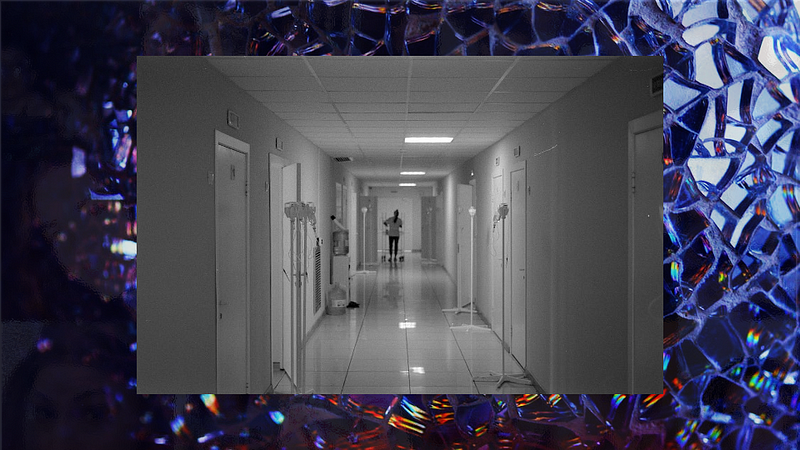
Michael, his kindness clear but his request just as firm, told me to undress. He checked for marks, bruises, evidence of what my father had tried to hide.
I saw in his eyes how dangerous this place would be for a girl. For me.
But this was Mississippi in the mid-90s. He had a job. Orders. His role was to prepare me for what he knew waited.
He kneeled in front of me. “What are you thinking?”
When do we eat? I wanted to say.
Food meant something different as soon as I was away from my family.
But instead, I told him, “I’m scared. I saw some guys earlier. I never thought it was like this here. They’re screaming and going in fits and some nurses had to take them down. I’m not like that. I’m not like them.”
“Well,” Michael said, “it may not seem like it, but they’re people like you are.”
“Like me?”
“They may look at your problem and think you’re just as weird. I mean, it is a little strange that someone would choose not to eat.” He paused, plainly uncomfortable about what was next. “Now, I don’t want to make you uncomfortable. But this is something I have to do.”
I closed my eyes.
He sat on the bench next to me. “I need you to go into the room over there. I’ll be there too, just around the corner. I need you to take your clothes off. You can put this around you.” He held up a small towel and handed it to me. “I’ll be around the corner so you can undress in privacy, but then I have to look over your body to make sure there aren’t any…” He swallowed, and the kindness in his eyes comforted me in the closest way he could.
“You think somebody hurt me?” I said, curious if someone could finally see.
Michael smiled. “No. I hope not. But we have to make sure.”
I took the towel and walked forward into the room. There were five steps from the bench to the door and they all passed by at once. All in a heartbeat. Gone and they could not be taken back.
“Go on, buddy,” Michael said.
You are not my friend. Let me out. Please let me go home. I’ll be good. I won’t do it any more. I’ll eat until I burst. Just please let me see my mom.
I turned around. “Who said, ‘In the beginning was the Word?’ Is that Genesis?”
“That’s not Genesis. It’s from John.” He gestured behind me. “Come on. Talking only puts it off. It has to happen either way.”
I stood around the corner. I put my hands in my pockets. I began to undress.
I would have taken off my shoes, put them on again, taken them off, but the nurses had taken them from me. The shoelaces were considered a choking hazard or, worse, a hanging hazard.
“Are you done?” Michael asked.
“No,” I whispered.
Michael stuck his head around the corner. “It’s okay,” he said.
“You said I had privacy.”
Michael put up his hands. “Right. Do it on your own time. I’ll be right here.”
The examination table had paper sheets across the plastic surface. Could I lie there and pretend to sleep? Sleep and never wake up?
What if I threw my consciousness to the corner of the ceiling? That worked best when things got worst, like what had happened last year when the son of my dad’s best friend came over and told me to pretend like I was his wife.
Telling anyone just got me in trouble. It didn’t matter if what he’d done was wicked or wrong — my place was to empower the goodness in these men, not to bring attention to their abuse.
Once undressed, I sat on the bench by the table and waited for Michael. My heartbeat slowed, my skin felt cool and soon would be freezing. I worried what Michael would say when he saw what was between my legs — whether he’d say it was normal for a girl or proof I needed to be saved.
“I’m ready,” I whispered.
Michael came out. “Okay,” he said and looked me over. “Lift you arms. Okay. Lift your feet. Turn around.” A horrible ten seconds as he looked at the back of my naked body. “Okay, back on the table.”
I lay down.
I take a knife from the cupboard. I hold it out to show the power it gives me, the control to alter my fate in a moment, to give the illusion that I have a say in whether my mom comes one step closer or lets me be.
I hope she takes that step. I need her to stop me.
“You won’t do it,” my mom says. “God won’t let you. You’re too important.”
I point the knife away now from my mother and put the tip to my chest.
“Go on then,” my mother says, in an instant defeated. “Do it. Do it! I can’t stop you.”
“I need you to sit on the bench,” Michael said.
I held a towel, so small, across my groin to keep it from view.
“Now this is the worst part, but it will only take a second. I need to see what’s between your legs.”
How did people do this?
How would I do it?
The same way I’d done everything else. Tell them it felt good. It felt fine. There was nothing to see but good intentions.
“It’ll only take a second,” Michael said. “I’m going to lift up the towel. All right?”
How to Choose a Room
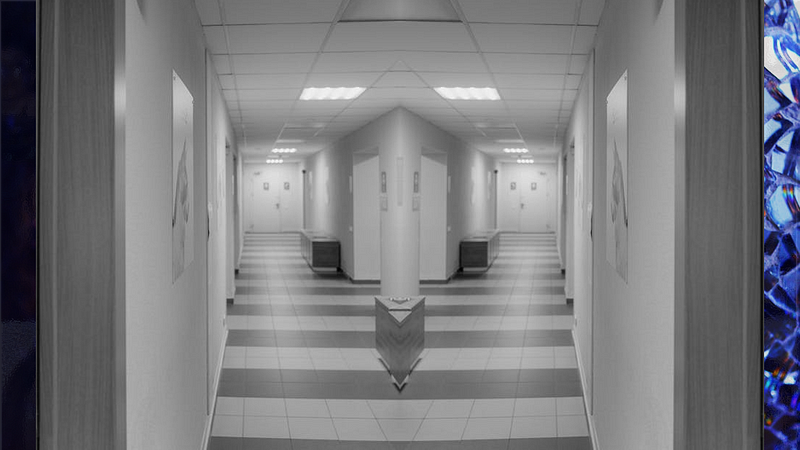
When he was done, Michael showed me to my room.
“This is where you’ll be staying,” Michael said. “It’s not so bad after a while.” He dropped a garbage bag full of my clothes onto the floor. “I’m going to leave you alone while you unpack. It’s better that way. But in half an hour, I’ll be back to bring you to the nurse’s station for more tests. Got any questions?”
“When do we eat?” I finally asked.
Michael smirked. “Breakfast is at seven-thirty. Lunch is at twelve. Dinner is anywhere between six and eight.”
“Why so late?”
“Sometimes the Valley trucks run behind schedule. It doesn’t happen often. Usually we watch television or play dominoes until it comes.”
He left me to make myself at home.
How to Find A Roommate
My first roommate was Brent. A slightly larger guy, buzzed hair, really polite. He spoke of his girlfriend in the girl’s wing one floor below us. Sweet times for his sweetheart.
They couldn’t touch and weren’t really dating, but they sometimes talked when the guys and girls found each other on the recess field.
I liked hearing those stories. I liked knowing a girl felt safe with him. I liked the idea that a boy could be safe for a girl.
And he wasn’t just fluffing. He had the stuff to protect us.
“I know martial arts,” he said.
My eyes went wide. The corner of my mouth lifted. Not much made sense to me, but fighting? I knew a little about fighting. A funny feature of hanging out with abusive men was that they sometimes taught me how to fight back.
The one who took me into the woods told me fighting back was the only way to make him stop.
“Show me what you know,” Brent said.
I didn’t mind if Brent had the power. I just wanted to show off for a minute.
My foot left the ground, my hip twisted, I rose onto the front of my other foot and spun.
It sounds a lot more graceful than it looked, but then Brent, despite his tubby middle, replicated the side kick with perfect form.
He wasn’t making this up. He knew stuff, too.
How to Make Friends

The next day, my therapist asked if I was making any friends. I mentioned Brent. Her face flashed with concern. I didn’t think anything of it. Everyone’s face flashed with concern when they looked at me.
“I’ll find a new roommate for you,” she said.
I blinked once, twice. “Why?”
She didn’t tell me.
I got to see Brent one more time when I returned to our room. Someone had told him why we were being separated.
His face turned red. He took one puffed breath, a bigger puffed breath, BIGGER — and brought his fist back and twisted toward the wall with a casually violent grace.
Inches from the wall, he restrained himself, deflated the speed almost like magic. He hit the wall with just enough controlled force that you could see how easily he could have punched a hole through it.
Instead, he’d brought that power back into himself.
Instead, he’d brought it into his eyes when he turned to me.
He said he’d hoped to protect me, he enjoyed being my friend, but “they” had once again interfered.
Brent, it turned out, was in the institution because he didn’t care how young a girl was — only whether he wanted them.
For some men, it doesn’t matter how many times you say no. If they can get you to say yes just once…
Except they’d stopped him.
How to (Not) Have Sex In A Mental Prison
No one had their own room. You were paired with another boy. If they were lonely, those boys became friendly. They satisfied each other. Turn off the lights, pretend until it’s over. You never knew how that kind of need affected a boy until they had to live with it.
When they got caught, they were punished. They were separated into single rooms and taught the evils of homosexual desire. The orderlies reminded them that heterosexual desire was evil, too, if it took longer than five minutes.
And if you got caught…
You didn’t talk back. You didn’t try to explain yourself. You definitely didn’t claim you hadn’t done anything — even if you hadn’t done anything.
An inmate took their punishment. Cruelty, it turned out, was part of the point. Pain would purify us of our illness, or at least teach us that the pain of punishment would always be worse than if we’d just obeyed.
If you had a problem with it, you brought it up in your next therapy appointment, where the therapist would explain why your behavior was pathological, why the right and smart thing if you ever wanted to get out of here was to shut up and do as told.
How to Eat in a Mental Prison
One meal above all others stands out in my memories at the mental institution.
I was at the table with a male staff member. Part of my dinner was potato salad. It tasted disgusting. Every bite made me want to throw up. The urge to vomit was real.
I begged him not to make me eat it.
I would eat anything else, but he wouldn’t listen.
He stayed there with me at the table. He waited patiently. He had all the time in the world.
The other patients finished and left the cafeteria one by one.
I curled into a ball on the chair.
I stayed. He stayed with me.
I begged him not to make me eat the potato salad.
I did what my father had convinced me would never help. I told him what the therapists and the doctors and the nurses kept telling me would save me.
I told the truth.
I told him it wasn’t about calories, it wasn’t about food, it was about how physically revolted I felt eating this.
“Please,” I begged him.
He said no. He said, “You’re going to sit here until you eat it.”
I cried. I let out the few final tears left to me.
I tried the trick that had so often worked with the pedophiles inside and outside of my family’s cult: “I’ll do whatever you want, as long as it isn’t this one thing.”
Except he wasn’t going to let go of this one thing.
The point wasn’t even to do what he wanted. Last week, he’d forced me to push the potato salad aside in favor of the calorie-packed protein shake he was now refusing me.
Like my parents, his purpose wasn’t to empower me. It was to control. To tell me what to do and to change it up as often as needed until I stopped resisting, stopped thinking, stopped feeling, stopped speaking, and simply did as was told.
“Eat it,” he said.
How to Know When to Quit

Once a week, I met with Sharon for individual therapy. A heat rose in my face whenever she entered the room.
“Look at you, man,” Josh said, a thirteen year old drug and sex addict who’d been there a little longer than me. He often went home on the weekend for a two-day pass, during which he did every drug he could get his hands on. He claimed that he drank a cup of laundry bleach before returning. It hurt like hell to piss out, he said, but it cleaned out his system.
When Sharon came for me that day, Josh laughed and pointed at me. “You’re turning fucking red, man! You have a crush on your therapist.”
I smiled but said nothing. My brother had told me even a fool seemed wise until you opened your mouth.
“Come on, Stephenie,” Sharon said. “And please watch what you say, Josh,” she chided in a high voice, like a mother to a child.
I would never have admitted to a crush on Sharon. Not that I had anyone waiting for me, but the younger part of me had fallen in love and dreamed of seeing her again when I got out.
I sit on the counter of the kitchen. All seems well for me until a longtime friend, Josiah, stumbles in a drunken haze over to him and murmurs, “So, when are you and Andrea getting back together?”
Until then the question has never occurred to her. Winnie assumed her devotion would eventually be answered with love.
So he stops speaking to her entirely lest her dream of reunion be proven simply that: an intangible fantasy.
Sharon led me into a small room with a table and two chairs.
“Here are some keys,” she said, holding up a ring of five keys. “Let’s say each one represents something. You’re a writer so you understand metaphors.”
Sure, but as a concept. That didn’t tell me what she wanted. “So what do they represent?” My face finally felt cool.
“Each one represents a different problem. You get to choose which key we’ll deal with today. Any problem you want to talk about, we will. It’s your choice.”
“I don’t know.” I shook my head. “Like what?”
“Well, that’s up to you.”
“Um…”
Whatever occurred to me hit a brick wall no hammer could break through— the warnings from my father about what would happen if I ever told anyone the truth.
Sharon picked a key at random, but looked at it like it held some secret significance. “What about your mother? Does that ever bother you?” She paused. “Or does it make you happy? Do you like your relationship with her?”
How to Fool Everyone
“What do you think about your parents going into therapy?” she asked, referring to my dad and his newest wife.
“I hope it helps them,” I said. “Is it helping them?”
“It’s too soon to say. You know how these things go. Do you want to talk about some of the problems you have at home?”
My father had given me explicit instructions to be careful with what I said. If I gave the wrong impression, I wouldn’t just be institutionalized. I would be put in the care of the government, ripped from my family, and given to some foster home, where everything I thought was bad now would be even worse.
“Like what?”
“You can’t expect me to tell you what problems you have at home. You tell me.”
“I can’t think of any.”
“Stephenie, everyone has problems.”
“Even you?”
“We’re not here to talk about me. We’re here to talk about you.”
How to Talk About Yourself
As the weeks turned into months, we had the same conversation over and over and over. My passes dropped from twenty-four hours to twelve, to six. They allowed me a final call to my family, then took away my phone privileges, too.
My dad was right. This was a prison, and I was never getting out.
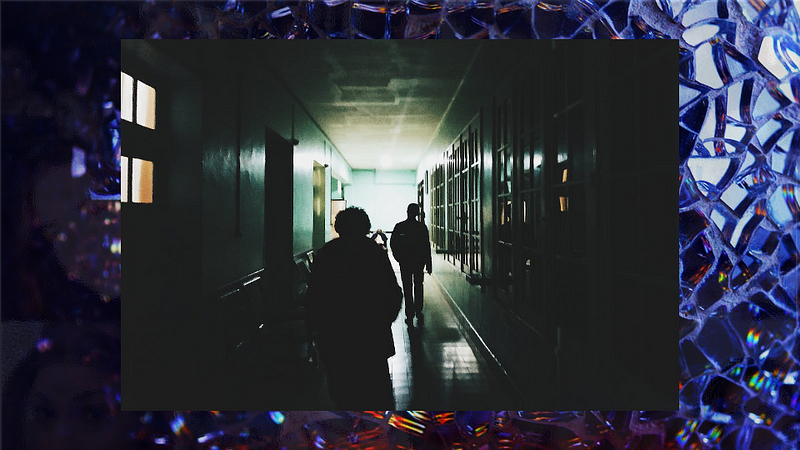
Once a month, I met with Meredith, the head physician and supervising therapist over half the people in the girls wing, half the people in the boys wing.
She gathered me into this tiny room stuffed with a table and three chairs, two on either side of the table and a third for an orderly to sit on in the corner. Sharon was there, of course, along with the rest of my team.
“You have to start talking,” Meredith said.
The walls seemed thicker and closing in with every second. I inhaled, and the air tasted stale. “Talk about what?”
“Anything. There are no right or wrong answers. Until you start talking, we don’t even know the questions.”
Now the air had lost all traces of oxygen. “I just… I don’t know what to say.”
“Say whatever you want.”
“I guess… I’m sorry. I’m having some trouble catching my breath.” Until then, I’d believed this stay would be like the rest. Long, hard, grueling, but ultimately, I could always hold my breath longer than the people around me. “When can I go home?”
Meredith took off her glasses and rubbed her eyes. “You have to show me some insight into your condition.”
I swallowed. “What do you mean…insight?”
I knew what the word meant, but I didn’t know what it meant. My father hurt me if I reached for a basic definition. For him, the facts were the facts. Any deeper analysis, he taught me, came from a shameful lack of conviction.
“I can’t let you go home until we begin to understand why you’re so sick,” Meredith said.
“That doesn’t make sense,” I said, finding my voice even if I couldn’t find my breath. “Everybody wants someone that doesn’t ever get into trouble. Everybody asks for somebody that doesn’t get angry, doesn’t lose their temper, just lives by the rules set for them and doesn’t mess things up.” Tears were at my eyes now. I could barely breathe. I struggled to speak. “Is it so wrong that I’m like that? That’s what my dad told me to be,” I said.
She looked at me with hopeless concern. “If you start talking to Sharon. She wants to help you. You can trust her. Talk to her and I’ll see what we can do about a small pass for your family to visit you.”
“How?”
“They will come onto the grounds for three hours. You‘ll be able to walk under their supervision.”
“When can they do that?”
“That depends on you, Stephenie. A lot can change if you just tell the truth.”
As if to prove their point, the next morning brought a Mississippi Miracle.
How to Survive Winter
Winter that year came suddenly and mercilessly, a cold chill that swept across the trees, causing them to shed leaf and life. Snow fell for the second time in my life, a substantial amount that had every patient complaining when it was announced no one would be allowed outside.
In Mississippi most years, we just got bitterly cold rain that hardened to ice and mush. Real snow was the treat of a lifetime.
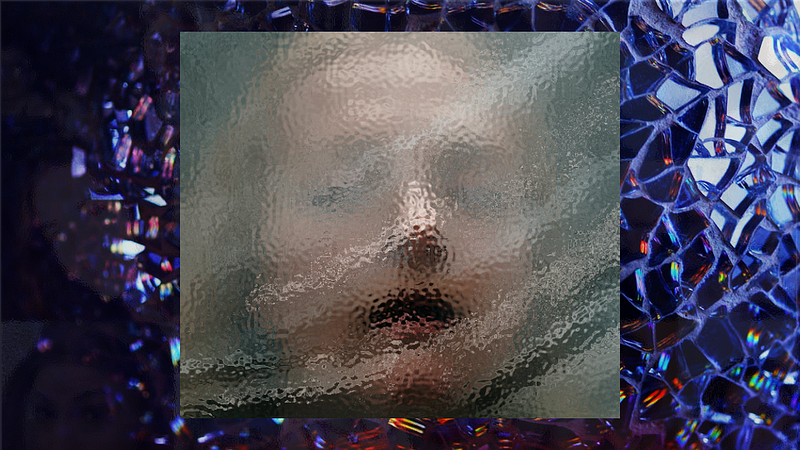
For the first day, me and several others sat in the dayroom, staring out through the windows, eager for the forbidden. The TV rambled on behind them, but we paid it no mind. We had eyes only for this white silk that covered the land.
At six o’clock the next morning, half an hour before we all would have been woken for breakfast, I woke to a scream from down the hall.
Me and my new roommate, Josh Blaire, went to see what the trouble was. We exchanged worried looks. That had been a real scream, and the sound of commotion in the hall was intense.
Dangerous? Probably. Could you stop us? Absolutely not.
Josh stepped outside the room — something large and white hit him in the face. He fell to the ground.
A second blur of white flew past my face and hit someone else down the hall. Snow. It was snow! The assistants, sympathetic that the patients could not go outside, had instead brought a bucket of soft white wet to them.
How to Survive Summer
The snow lasted for two days, but then the temperature went from biting cold to sweltering heat.
That’s Mississippi for you.
We were allowed outside activity perhaps twice a week, sometimes a third for those — like me — who didn’t go home on the weekend.
A tall wooden fence enclosed the backyard, which consisted of a few benches around a basketball court, the primary source of entertainment.
I, like always, sat on the bench with a book, occasionally glancing at the others but more or less feigning disinterest. What was the point of the game? It was better to sit unnoticed than risk being embarrassed, which was exactly what would happen if I ever played.
The basketball flew from the court and hit the bench, barely missing me. The metal frame shook from the force it had been thrown with. It was obvious who had thrown the ball — a boy named Steven.
Steven was sitting with a boy named Patrick. I didn’t know the second one yet, but I’d come to see him as the only kind of ally you could have in this place.
Steven wiped the sweat from his forehead and stepped toward me.
“What’s wrong? Too girly to play with us?”
All I wanted was to be left alone, to be out from everyone’s attention and left to read my books. Why did this guy want to bother me?
“I’m just reading,” I said.
“Yeah, I can see that. Some crap book for a crap kid with a crap condition.”
“Hey, go easy on her,” Patrick said.
“What did you say?”
“Nothing. I didn’t say anything.”
“Thought not. I’m just going to teach this fatty a lesson.”
“I’m not fat,” I said.
“Sure you are, fatty. Did your roommate get to you yet, fatty?”
I swallowed. “What do you mean?”
My fear was real. While Brent was no longer my roommate, my newest one could be just as bad.
“And they say books make you smarter?” Steven shook his head. “We all know your roommate’s a freak. You’re a freak too, now? Aren’t you?”
The staff noticed the game had ended. They looked over at the court but must have concluded nothing was wrong, because they looked away and continued their conversation while the other five patients outside with us idly watched the entertainment.
With his own brief glance at his audience, Steven said, “Have you ever even been with anyone?”
My face flushed crimson.
“You know what I’ve done?” Steven beamed. “I’ve had all kinds of girls. I’ve licked white, black, brown, Mexican, Japanese, Chinese, Vietnamese. You name it. All of them know what it’s like to have me inside them.” He stepped closer and put his face close and whispered, “I could kill you before they even realized what had happened. But I’m not going to do that. I’m gong to wait one day until you’re asleep. I’ll wait until Josh is gone and you’re asleep. Alone. I’ll come into your room and cover your mouth and no one will know you had me inside you, too.”
“You wouldn’t do that,” I murmured. “They’d find out and then you would never get out of here.”
“Maybe. Maybe not.” He looked from me to the fence surrounding the court and the campus that led to the outside world. “Maybe I’ll just wait until you’re free. Maybe I’ll wait until I see you outside and instead of fucking you, I’ll stick a needle in your arm. Maybe it won’t be anything lethal. Maybe it’ll just be a shot of heroin. They say it only takes one hit to make you add ic— ”
Steven never saw the blow coming. Patrick’s fist hit him in the jaw. Steven staggered, but he stayed on his feet and may have fought back if Patrick had let him. Before Steven could shake off the blow, Patrick put his fists to action — one, two, three! A drive to the gut, another to the head, a last hit to keep him on the ground.
Patrick kicked him, shouting, “Dumb fuck! Why don’t you leave the kid alone? You just don’t know when to quit.”
How to Tell the Truth
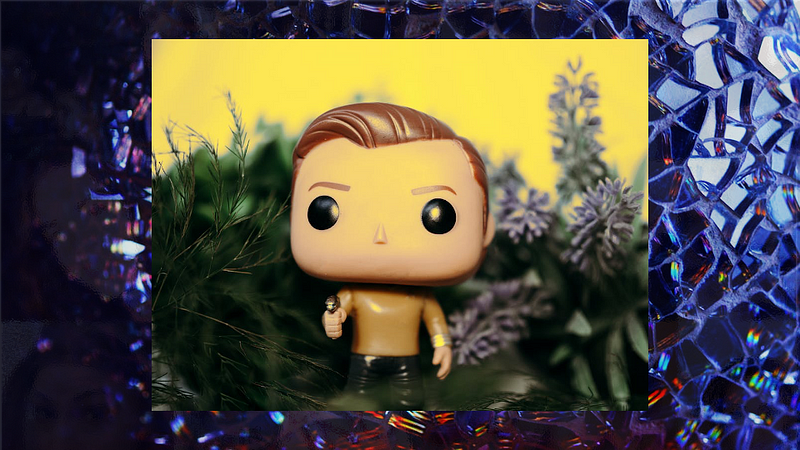
My only friend was Michael, whose real name I came to learn was Michelle.
Every afternoon, Michelle came on duty and sat with me. She soon became my friend in a place where I was considered an outsider even to the outcasts.
Who could blame them? A girl on the boy’s wing was as absurd as the idea that I’d have been any safer on the girl’s wing.
“I’m reading this new book,” Michelle said.
“Which one?”
“It’s a Star Trek novel. I love Star Trek. Are you a Trekkie?”
“I love Star Trek.”
“Oh, good. Because if you didn’t I might not come talk to you anymore.” She laughed. “This is one from the old series. Back in the days of Kirk.”
“Yeah, I didn’t like those as much as the new episodes.”
“Oh? So you’re a Picard fan?”
“Yeah.”
“Why?”
“Ummm…”
Michelle rescued me from admitting I didn’t remember very much. Those memories belonged to a different part of me — the one that had barely escaped the son of our dad’s friend by fleeing to the corner of the ceiling.
“I’ll tell you why Picard isn’t better than Kirk,” Michelle said with the certainty of scientific fact. “Because in the original series, Kirk always got the girl, always beat the shit out of anyone that messed with him, and never went without fighting. Did you see the new movie? Kirk lives. Again!”
I later learned the movie was called Star Trek: Generations. If I’d seen it, I couldn’t remember.
“I like Data,” I said, grasping at straws. “And LaForge. I love watching Levar Burton.”
“LaForge was good,” she said. “But again, he doesn’t beat Scotty from the old series. Scotty could fix anything with a phaser. He would crawl into tubes and repair the warp drive in a quadrant of the ship that had nothing to do with the warp drive. And you have to admit, Scotty in himself was just a badass.” She grinned real big, getting into her retelling . “In one episode, these aliens had invaded the ship. The only way they could be beat was to challenge them to some game. They beat everyone except Scotty. What does he do? He challenged one of the aliens to a drinking match. The alien passes out and Scotty has another shot just to toast his victory.”
She was the first person I can remember waiting for me to make sense of what she’d said.
I hadn’t told her about my family’s cult. My dad had shaken that truth into me over and over again. If I told anyone, my dad promised the state would put me in a foster home, where I would become broken and forgotten in far worse ways than would ever happen with my family of origin.
The only difference between then and now was the possibility of whether I’d ever go home. But now that I was in this prison, now that I was here with my friend — did I want to go home?
Finally I asked, “What did you think about the religion in Star Trek?”
She frowned. “What religion?”
“I don’t know.”
“Well, if you mean the absence of Christianity…” She shrugged. “I’m not surprised.”
“How’s that?”
“Ok,” Michelle said. “What religion are you?”
That was a question I couldn’t really answer. “Baptist,” I said, reaching for the lie my dad sometimes said when in public.
“Okay, so basically you’re a Christian that believes the Bible is the word of God.”
“I guess so. That’s what my dad says.”

“Well I read the Bible too,” Michelle said.
“I just see it as more of a historical book than the inspired word. And even that is pretty unreliable. People bicker and bicker about evolution against Biblical creation without even stopping to ask which creation story they’re trying to support. There are two in Genesis alone. A lot of them seem to agree that God or a minor deity did it. Most people just can’t seem to agree which one.”
“But why?” I said, and the question felt like I’d stepped off a cliff.
She was there to catch me with the softness in her eyes. “I think religion is used more to control people. Do what we say you should do, because it isn’t us telling you. It’s God. It knocks out the whole necessary explanation. If God said to do it, of course it’s the right thing to do.”
“Like in Star Trek?”
She snapped her fingers. “Exactly like in Star Trek. They didn’t have religion because with the connection to alien worlds, the whole infrastructure fell apart, the same way it’s starting to now that people throughout the world are becoming less isolated from each other. I mean, why would God go spreading different gospels over different continents? Can you imagine what would happen if we took to the stars and made a new planet our home? All the sacrifices that happened on Earth wouldn’t mean anything.”
“But they’d still have happened,” I said.
She shrugged. “What’s the point of the sacrifice if it doesn’t inspire faith?”
How to Know When to Quit
I wasn’t there when Meredith met with my parents, but years later, I looked over the stacks and stacks of medical records that formed the pieces of my epiphany.
This is as close as I can piece together what they said.
“Mr. Morgan.” Meredith paused, looking from my dad to the seat next to him. “Where is Mrs. Morgan?”
“She didn’t want to come.”
“Of course. Was she upset over our last conversation?”
My dad coughed. “No, not at all. That is to say, how do you mean?”
“Every couple that comes to marriage counseling has problems of blame to work out. Your wife thinks this is your fault. No small wonder she left you to come on your own.” Before he could comment, she took a manila envelope from the desk and opened it. “This is Stephenie’s chart. We keep a record of their behavior, little and small. Nothing goes unaccounted for in this place, I assure you of that, Mr. Morgan.”
He looked at her with the same shallow gaze that defined how he saw everything else. “Sure,” he said.
“We are deeply concerned. You understand?”
“Okay.”
“Has Stephenie spoken to you recently?”
“Only last Monday. She said you were generous enough to give her a twenty-minute phone call.” He smiled. “The nurse on duty allowed her an extension of two hours. Thank you for that.”
“Two hours, you say?” For Meredith, rules were rules. Flexibility was why I kept getting sick.
“I’m sorry. Was that wrong?”
“No,” she said, ready to take it up with the appropriate person. “The nurse is at liberty to use their or her discretion for such matters. Far more important, has Stephenie spoken to you of a staff member named Michelle?”
“Yes.” My dad smiled. “She enjoys having someone around that she can talk to about Star Trek.”
“Yes,” Meredith said. “Well, that’s the problem. We can’t get Stephenie to make friends with anyone else. Michelle is the only person she talks to.”
“How is that a problem?”
“Michelle isn’t a real person,” she said.
His pause betrayed how much he already understood. Finally, he asked what no one could answer. “So how is she supposed to get better?”
How to (Not) Get Better
It happened like this — or close enough to it to count as a memory.
Patrick, Brent, and the third boy Steven talked about it for weeks. Maybe longer. They had to be careful.
The only way out was by the nurse’s station at the end of the hall. Two sets of double doors were to the left and right, each one leading to a potential exit. That exit was locked unless someone flipped a switch on a panel behind the nurse’s station, which was just a desk that curved around an enclave of chairs, viewing monitors for the isolation rooms, and a cleaning room.
To get in or out of the nurse’s station, you entered by an always-locked side door. If you wanted out, you had to first get in there, then get back out before you could take step two and make it out of the building.
What they needed was time and invisibility, so they waited until two in the morning.
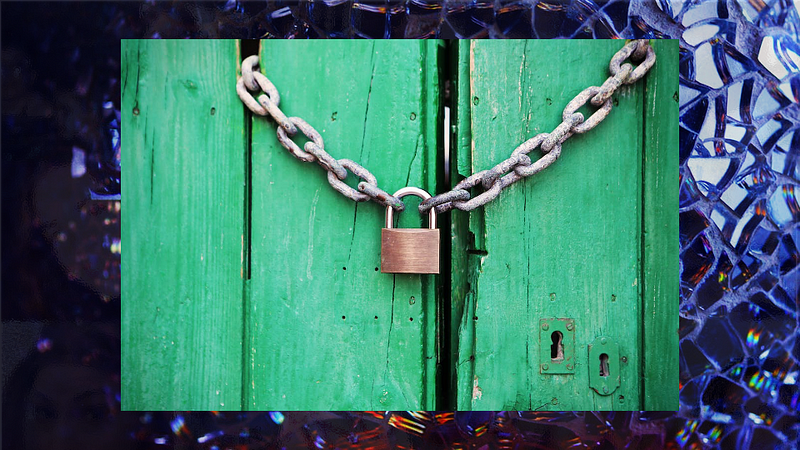
The night shift was always poorly staffed. The staff assumed the patients were asleep, waiting for an early call to breakfast at six-thirty. They were mostly right.
Tonight, there were two assistants and a nurse. One assistant had gone to the restroom, the second assistant had fallen asleep, and the nurse had gone into the dayroom to watch television.
Steven met Brent and Patrick in the bathroom. They hid in the shadowed corners. The lights were already off and they left them that way.
“Don’t fuck this up,” Patrick said. “If they catch us, I’ll live here for the fucking rest of my life.”
Steven cocked his head. “You worry too much. What are you?” He fluffed his nostrils. “A fuckin’ pussy?”
“Man, lick my fucking — ”
Brent put up his hands. “Hey. Don’t go calling anyone around here names. We’re in this together, right?” His southern twang caused him to pronounce right like rat.
“Fuckin’ A,” Steven said. “If we make it out, all we have to do is survive for two weeks. Two fuckin’ weeks! Then they’ll discharge us.”
He’d been making the same promise all month. There were lots of urban legends inside the hospital. The biggest was the myth of freedom.
If they could just survive for two weeks, they would be free. He knew it because a bunch of people had tried to escape before. Steven had paid attention to each attempt and why they’d failed.
Yes, Patrick was right. If they got caught, it was all over.
But if they broke free?
Yeah, they might have to hide until they were eighteen and old enough to decide for themselves, but that wasn’t any different than what they were facing at home. In their minds, they had nothing to lose.
There is always more to lose.
Patrick, Steven, and Brent made a perfunctory glance down the hall to make sure the nurse was still watching television, the other was still in the bathroom, and the other was taking a much-needed nap.
Eyes shut, dreams on high, and the rest of us forgotten.
Patrick and Brent waited in the doorway of the bathroom while Steven tiptoed in socks to the nurse’s station.
A string of drool hung from the sleeping assistant’s mouth. She was an older woman named Faye. We all liked her. She treated us like people.
Steven thought that made her stupid.
As Steven went to open the door to the nurses station, her eyes opened — and fixed on him.
“What are you doing?” she said.
Steven wasted no time.
He leapt over the nurse’s station before Faye could touch him.
She was fumbling for her keys already. She was old. He was young. If he hit the switch, he’d be back over the counter, and she’d still be right here.
The nurse’s station was always locked, so in the seconds she searched for the keys, he flipped every switch along the panel. Who cared which did what? He only needed the switch that — and there it went. One of them opened the doors.
In Faye’s scramble, she hadn’t even called for help.
Steven leapt back over the desk, where Patrick and Brent were waiting for him.
How to Find Freedom
The moment they were outside, Steven took off on his own.
Brent and Patrick had said they would all split, but the two of them ended up running, sometimes walking, sometimes grunting, through the creek on the side of the highway.
They never said how the state trooper caught them so fast. At six the next morning, I sat at the window and held my hand over my mouth as the two of them were brought back in handcuffs.
Steven, however, was still at large.
He was smart enough not to call his family. If you did, you could start the clock on how fast the hospital found you. Your family were the ones that sent you there. What made anyone think they wouldn’t send you right back?
The secret, if Steven truly wanted his plan to work, was to trust no one.
But everyone has their drug. The one that doesn’t do it for 90% of the rest of the world, but for you? You just can’t do without.
A week on the streets was enough. He called his girlfriend for a trade that didn’t need trust. A dry place to sleep would be a bonus.
She loved every word of it, eagerly accepted the proposal to be his safe house. A day turned into a week, but then a fight turned into a catastrophe and she turned him in.
How to Accept Your Fate
I never forgot the look on his face.
They brought him back in like a prisoner, his hands cuffed behind his back, his ankles shackled.
To anyone else, that slow and awkward amble looked like desperation.
I knew better.
Steven hung his head low, but underneath those sunken eyes was a grin split from ear to ear, like that of a child who has just fallen from his first bike riding attempt but knows that every try afterwards will be a step closer to two-wheeled flight.
I guess his boundless enthusiasm for the next attempt was why we didn’t notice what Patrick was planning. For Steven, this was the end of escape plans. But for Patrick, there was always going to be a plan B.
To tell you the truth, he’d had the plan in his back pocket all along. It’s just that he couldn’t take anyone else with him. And once he took that first step, he’d have to accept the inevitable.
Escape was always going to be a one-way trip.
How to Take Your Punishment
For the next two months, all three escapees were put on total restriction. They were forbidden all privileges. They couldn’t speak unless absolutely necessary, otherwise all conversation was limited to written word. Their clothes were kept in storage. Instead, they wore what we called spuds, which looked like the same thin blue smocks medical staff wore.
When on Total Restriction, they stayed in their rooms at night or in the restriction room during daylight. Any patient found speaking to them was punished.
Television screens were behind the desk of the nurse’s station, each one connected to a restriction room. From down the hall, I could hear Steven screaming. When I walked by, Brent looked out the tiny window on the door with haunted eyes.
And then there was Patrick.
How to Escape for Good
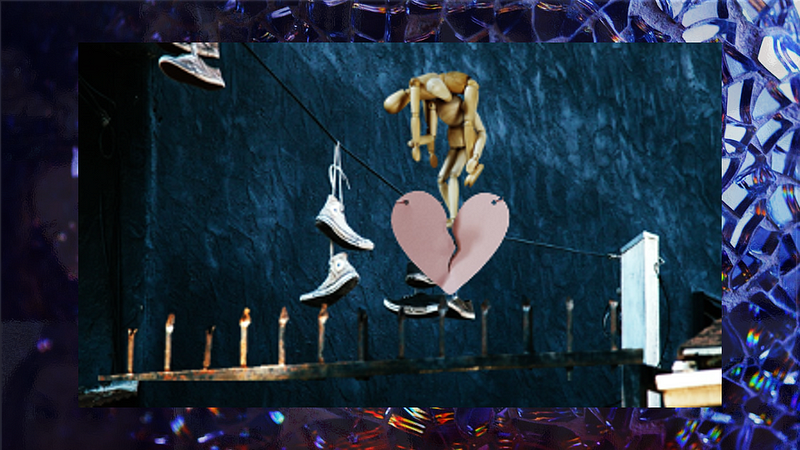
That night, when security was relaxed and you could get away with a lot, Patrick didn’t show his face once. Not even to crack a joke or take out his favorite needle to perform improvised piercings on himself. His nipples had seen more stab wounds than a pin cushion.
Josh was just my roommate, but he was a real friend for Patrick. And despite the risk of being caught, he wouldn’t forget his friend. They were in this together. He made sure the coast was clear before crossing the hall.
He wouldn’t be long. All he wanted was to check on his friend. But as Josh entered Patrick’s room, he smelled something off.
Was that…?
It couldn’t be.
He sniffed the air again, just slightly, then took in a big lungful of the stuff. His lungs refused and threatened to spit out what little they’d already consumed.
He’d expected a bad smell. Maybe Patrick hadn’t showered in a while, or he’d hidden old food under his bed. Bad smells were everywhere in this place.
This was different. This made him tremble.
It didn’t smell like death was coming. It smelled like death was already here.
He took a cautious step forward. One step — and the darkness faded a little as his eyes adjusted.
Another step — and the darkness faded enough to begin to see.
The blanket lay halfway unraveled on the floor. The other half hung around Patrick’s neck.
It shouldn’t have been strong enough to hold him from the ceiling, but there he was, the blanket torn into strips and tied through the grating and slung around his neck and now holding him with an embrace Josh could only rush forward and hope hadn’t yet claimed his best friend.
Patrick’s face still had color, despite his slack expression. But Josh was just a kid and didn’t know why the rope was the only thing keeping any color in place.
He’d find out as soon as he cut the rope.
But there were so many more instants for Josh to get through first.
How to Break Glass
All of us instinctively knew where to draw our own lines. Our problem was that we never knew what counted as someone else’s.
Josh wrapped his arms around Patrick’s knees. He held him up, desperate to keep his friend close enough to alive long enough to cut him down and help him breathe again.
Was Patrick even now looking at Josh and wondering why it had taken him so long to come?
Was Patrick even now struggling for one more breath that didn’t have to be his last?
“Oh, shit,” Josh said. He wanted to scream for help, but those were the only words he could speak. He repeated them louder and louder like a broken record, turning up the volume, screaming, screaming, screaming.
“Oh shit oh shit oh shit oh SHIT OH SHIT OH SHIT!!!!!”
Until the nurse and her assistant came.
Until the staff saw what they’d missed.
How to Whisper Your Last Words
I wasn’t there to see Patrick’s body, but I was there to see his ghost.
He died while I was away on a rare pass home. The night I returned to the hospital, I lay awake all night. Each time a nurse checked on me, I pretended to be asleep by staying still but peering through the darkness. But on the fourth check, Faye noticed my open eyes.
After those three boys escaped on her watch, she’d vowed not to fail us again. But this was a new kind of grief.
“What’s wrong?” she asked.
“I can’t sleep.”
“Sorry, honey. Guess a lot of people are handling this in different ways.”
“Can I have any medicine?”
“Hold on,” she said. She disappeared behind the corner and returned a minute later with two pink pills cupped in her hand and a glass of water.
“Take these,” she said.
“What are they?”
“They’ll help you sleep.”
“Are you allowed to do that?”
“I write it off on your chart. It’s as simple as that.”
The pills had me under in a matter of minutes. The cold dark room slipped away.
How to Hear the Truth
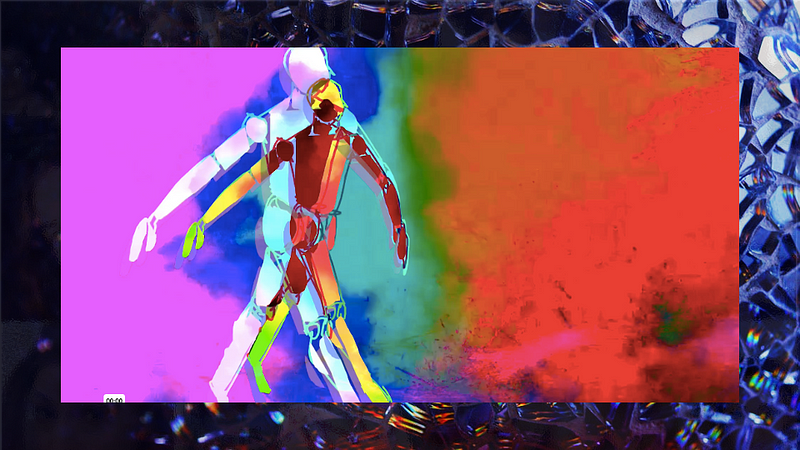
A hushed whisper woke me. I tried to ignore it.
Another hushed whisper came closer to my ears.
I turned towards the wall and put the pillow over my ears. The whisper, still light and breathy, grew louder and faster. I opened my eyes. Somehow, all the lights were on, filling the room with a bright, painful haze.
Was it daytime? Had the drugs been so strong that they’d let me sleep until tomorrow?
But again, I heard the whisper. This time, I caught the words.
“Did you see them?”
Now the whisperer was joined by another, and another, a cacophony of voices couldn’t ignore if I wanted to. As I stepped into the hallway, they immediately fell silent, as though a hand clamped over every mouth to hide their secret message.
I looked both directions but saw no one. I decided to find Faye. Whatever she had given me had done more than help me sleep. I stumbled when I tried to walk and steadied myself against the wall.
On a whim, I tried to open Jerome’s door, two rooms down from mine. The handle refused to move. I tried other doors on the way. Every door was locked.
I had no other way forward except to the end of the hallway.
I had no way back except to a room whose door was already closed.
A body lay on a gurney at the end of the hallway. I could have just stayed in place, but I felt inexorably drawn to it.
Each step towards it beat with my heart. Step, thump, step, thump. If only it had taken a few more steps to reach the body.
I could still turn around. I didn’t have to see what was at the end of the hallway. But I’d come too far to turn back now. Patrick had shown that there were no lines a person wouldn’t cross. No lines a person couldn’t cross.
All you had to do was decide.
Once I made the decision, the hallway ended with one more step. Then I was in front of the nurse’s station, the double doors, and the gurney holding what could only be Patrick underneath a white sheet.
I held my breath, then pulled back the sheet.
The body was cool blue. The skin stretched taut over the skeleton, so tight it looked less like a fresh corpse, more like a skeleton put to rest.
But the face. It wasn’t…
It wasn’t Patrick’s.
I leaned down. I squinted my eyes. I’d never looked so closely before, never felt such an instant sense of utter confusion yet utter recognition.
The closer I looked at the face, the more certain I felt.
But it couldn’t be.
Could it really…?
Then I heard a sound behind me. A sound so loud, it woke me up to what had put me here in the first place.
But more than that, what it would take for me to get out.
How I Finally Got Out
The next morning stuck out in my memory not because of the dream, but because it was the first time I remembered waking up feeling something.
I’d felt numb for so long, I didn’t know what to call this sensation.
In group therapy, I raised my hand to speak. It wasn’t unusual for me to make comments, you know, involve myself in other people’s problems. Talk about myself, though?
“I want to talk about something,” I said.
Today’s group was led by my individual therapist Sharon. “What’s wrong, Stephenie?” She couldn’t hide her awareness of what was happening.
“Well…I feel really sad,” I said, understanding what I was feeling the more I talked about it. If only I hadn’t waited so long to start.
I looked around the room. All eyes were on me, as though begging me to put to words what none of us had the courage to speak. Some things escaped words. Saying them out loud just made them smaller.
I needed this one to be small.
I said, “Patrick dying didn’t really seem like it would be a big deal. I barely knew him.”
Sharon leaned forward. “You lived across from him for quite a while. I can imagine what it’s like for him to suddenly not be there.”
I swallowed. “I didn’t really start to feel anything until we were at the funeral reception. When our teacher sang ‘Amazing Grace,’ everyone else started crying. I remember looking at them and wondering how they could be so free with how they felt.”
“I noticed you seemed a little upset,” she said.
“I came back to my room and just started crying. It all seems so unreal. I just never saw death so close before. It’s always been so far away. Far enough that I didn’t have to see it if I didn’t want to.”
Sharon looked at me with an expression that couldn’t hide what she was hoping had happened for me. “Has this changed how you see yourself?”
They looked at me, and I looked back. This was a big moment.
My therapist took a breath with me. “What do you want to say, Stephenie?”
How to Escape Your Family
In the end, the way out required me to go back inside.
Not into a hospital, not into a mental health institution, but back inside myself and everything my family spent decades burying with abuse.
I had a physical reaction when I finally admitted what happened. Not just that I went into those hospitals, but the details of why I’d gotten so sick in the first place.
I’m not crazy. These things happened.
I know they happened because of the lengths my family went to bury those secrets inside me.
Keeping those secrets hidden in me meant I had to be contained. Controlled. Diminished. If it killed me, so what? Those secrets would die with me.
The hospitals made their mission clearer each time they welcomed me into their padded rooms. I wasn’t there to tell the truth. I wasn’t there to get better. I was there to endure Gender Conversion Therapy. I would be there until I returned to my parents as the boy they insisted I become.
In their own way, I think they were trying to protect me.
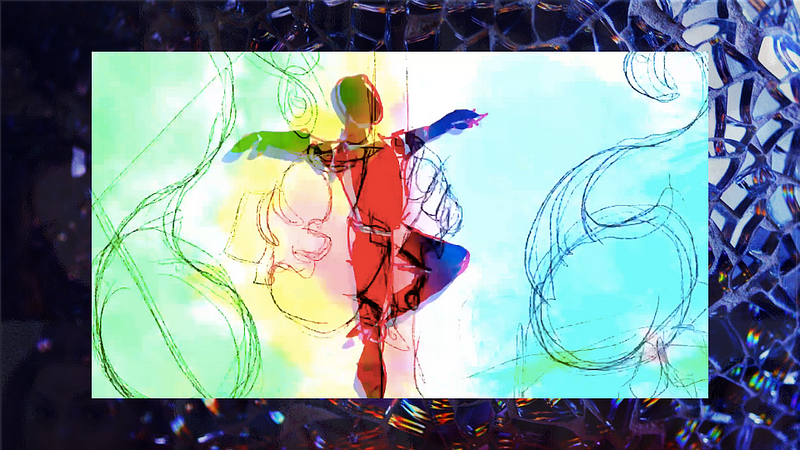
When the money ran out and the hospitals sent me home, my step-mom told me it had nothing to do with money. I was simply broken. Beyond repair. The hospitals had given up on me. The best I could do was weep, beg for forgiveness, and pray my brother would keep me safe.
I tried to tell my parents about the sexual abuse I endured from their friends. From the children of their friends. But my parents hurt me until I agreed it didn’t happen.
Why wouldn’t they? My parents were abusing me, too. The only thing “wrong” was that it had been anyone else who did it to me.
My father believed the reputation of his minister friend was far more sacred than admitting what his friend’s son had done to me. For my father, forgiveness means forgetting.
I tried to tell my friends about the sexual abuse happening in my own family. They laughed and said only a pervert would have questions about incest.
I tried to tell people who just met us and hadn’t yet been blinded by my brother’s charm. In public or in private, my brother caressed my shoulder. My arm. My hand. When he left me alone, he did what he wanted with me in the room.
A package deal, one person called us. If only they understood how sick the deal had been.
He knew better than to go too far — not with his own hands, only someone else’s. He learned from an early age how to manipulate people as his sexual playthings.
I know it wasn’t love. It was abuse by any other name. But it felt like love. I guess it looked like love, too. I just didn’t know how to quit.
How to Quit Drugs
I don’t drink, and I’m an atheist, so my first sponsor had to adapt the program in a few ways. They had no idea how far I’d take the limits of the 12 steps — or how far they would take me.
Like many people in fellowships such as Al-Anon, ACoA, and CODA, my most dangerous drug was mood-altering people. An abuser can give you a euphoric high like no other if you last long enough to receive a Love Bomb.
A Love Bomb isn’t just about intense affection. The abuser seduces you into a state of vulnerability so they can then feed off that energy. It’s why you’re likely to find seemingly benevolent abusers (like my qualifier) hiding in the plain sight of health industries like massage therapy, medicine, teaching, and social work.
They validate your most vulnerable parts, all while planting the seeds of dependency.
For a time, drugs — be they a substance or a person — gave me a false sense of sanity. And in that deception, they numbed me enough to hide my true self.
12-step programs didn’t just help me feel again. They helped me face the fear of feeling at all.
To be here, to be in my body, to be alive means to see myself as I truly am. And I spent decades terrified of what I would find.
How to Listen to Yourself
I tried to tell each new abuser what each prior one had done. Sometimes just to let them see how much it hurt. Sometimes to share the facts of what had happened.
One of those abusers was the father of my childhood friend. A frequent member, at least when I was a child, at Southside Assembly of God in kudzu-lined Mississippi.
I was just a little girl clinging to his shadow for safety from my own family. My parents touched me in ways that weren’t right. Their friends touched me in the ways they insisted were fine. And then this man did what he wanted next to me, a reminder that even if they left my body alone, no space was truly free from them.
The only real safety was whatever I could find inside myself.
During one of my stays home from a hospital, that man’s son came to my house late one night to meet my brother. I felt lucky to get to go with them.
Under the cover of midnight, he and my brother took me to the edge of the tennis park behind our house. Wouldn’t it be fun, they said, if I took off my clothes, exposed myself to the busy nearby road, and rolled the dice whether anyone could see this little girl’s naked body?
I didn’t know how to tell them no. My brother and that boy had shown me how much they would hurt other women if they felt threatened. I had no reason to think they’d treat me any differently.
I took a deep breath, went around the corner, and hated that there was greater safety in submitting to these predators than telling my parents what they had done.
How to Have an Honest Conversation About Your Mother
Once my biological mother left my dad and disappeared into a battered woman’s shelter for a while, my sister took over the motherly duties. She filled the refrigerator. She made sure I was alive. She did what she had to do to be there for her younger sister, even while she was breaking apart in her own ways.
Her friend — yet another redhead whose abuse I’m ashamed to say made me feel whole — groomed me for months. I resisted her at first because I had a girlfriend far off in Vermont. But as soon as I met that girl in person, she discovered what everyone else had discovered.
Something had happened to me. Someone had hurt me. And much as it scared me to admit, someone else would hurt me as soon as I went home.
Me and that girl broke up in short order. I wouldn’t touch her. I wouldn’t let her touch me. I had been groomed to only open myself when being possessed and abused. That girl was too healthy to stay with me.
But the redhead at home? My sister’s friend who’d groomed me for months already?
I’d never had a drink before, but when my sister brought me camping with her, that redhead, my brother, and a slew of other friends, I had more than a little to drink. More than a lot. More than I ever want to have again.
I tried to talk to my sister the next day about what happened. What her friend had done.
“I think she did that to everyone,” my sister said, as unable to engage with the abuse happening to me as the abuse happening to her.
I tried to tell my siblings what had happened each time I returned to them broken and wounded. I feared what would come if I didn’t accept their comfort. Be that my father, my mother, my identical twin brother, my sister, or any of the dangerous lovers I foolishly hoped would take their place.
I accepted the bargain each time. Their comfort brought cruelty and neglect, but also the safety of a bodyguard.
I feared what those bodyguards would do if I told them no.
I feared what they would do if I stopped lying for them.
How to Stop Lying
I’m not afraid of them any more.
Whatever remained of that fear came out of me when I vomited up their poison.
Once I got out of the last hospital, I used every computer I could get my hands on to get the memories out of my mind and to a place that had a chance of lasting.
Write the story. Save it. Preserve it.
I made random scribbles or wrote entire drafts on pages, but if Y2K taught me anything, it was that the scaremongers got it wrong. Digital is forever.
So I wrote on the computers at Hinds Community College. I borrowed a friend’s laptop. I used my dad’s. I saved everything to floppy disks and emailed each draft to myself.
Write your story. Save it. Preserve it.
My life would be easier if I had my own computer, but I might never have enough to afford my own.
And then my family let me know I wouldn’t have to.
How to Have One Last Family Christmas
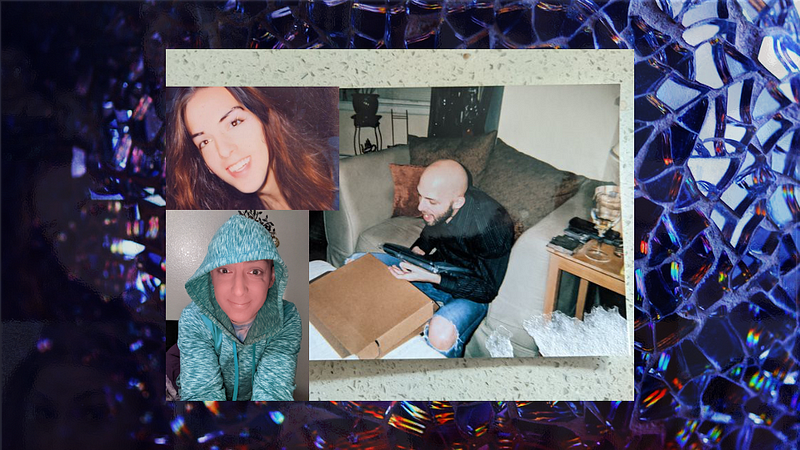
I still can’t believe how easy it was to make people think I was a boy just by wearing a beard and shaving my head.
But despite the disguise?
The look of delight is sincere.
I’ve written extensively about the abuse I survived from my parents, my brother, and my sister. The harmful impact of their actions doesn’t disappear just because I admit they also contributed to something good.
And the thing they did that Xmas wasn’t just good. It was a miracle.
That computer let me obsessively write for hours every day. It changed my life.
Finally, I could write my story.
Finally, I could save my story.
Finally, I could preserve it.
I wrote novels that never got published.
I wrote tons of short stories, most of which were published but are now out of print.
Note: You can still buy a copy (Amazon) of the Atrum Tempestas horror anthology for the low low low (low) price of just under $30. Just look for the story Skin Deep from when I was still going by the name Stephen Morgan.
I began attending a writing workshop in Athens, GA, where I discovered a profound feeling of community, kinship, and belonging among other writers.
I hit my mid-twenties, got sick of working retail, went back to school, and dove into the science of storytelling so deeply that it became my Master’s thesis: Book DNA: validating how successful mystery literature is constructed (written as Stephen Morgan).
I wrote whatever anyone would hire me to write, whether that be Wild Turkey advertorials in the lifestyle magazine Athena (now defunct), author interviews for the horror-zine The Monsters Next Door (also now defunct lol), and more horror short stories like “Up-Chuck Charlie” at Yellow Mama (not defunct…just out of print).
How to Go from Prisoner to Person
I kept writing, but more and more, I used my talents to help other people tell their stories, too.
I took jobs with boutique publishers like Entangled Publishing, where despite encountering the same sick systems I’d been raised in, I discovered as much joy in serving as an editor for best-selling and award-winning authors as I did in empowering debut authors to fulfill their publishing dreams.
I wrote for ScreenRant, Script Magazine, and Writer’s Digest.
I reported for Xtra Magazine, joining the ranks of Stephen King and the DOJ in the fight to stop what we predicted would be a dangerous merger between two giant publishers.
I switched hats from interviewer to interviewee and answered questions for Michael Lee Simpson, an award-winning entertainment journalist with credits among Variety, Entertainment Weekly, and People Magazine.
I picked my damn jaw off the floor when Michael next time invited me to discuss Stephen King with him alongside legendary filmmakers like Marcus Nispel (director of The Texas Chainsaw Massacre), Michael Grais (co-writer of Steven Spielberg’s Poltergeist), and Jeffrey Reddick (creator of Final Destination).
I laughed when he asked me back to join more filmmakers debating whether the newest Lord of the Rings streaming series was going to suck.
I interviewed Julie Cohen, the Oscar-nominated director of RBG who next delivered an eye-opening look at intersex people in the documentary Every Body.
I interviewed Celia S Friedman, the author of the sci-fi/fantasy books that kept me alive during my darkest days in the hospitals.
I listened to their answers when I asked how they’d discovered their own differences as worthiness.
I remembered my story is just as worthy as everyone else’s.
How to See Your Own Worthiness
I got a new computer after a while, but it started with the one my family got for me on Xmas 15 years ago. That memory is as precious to me as the one on the left from over 30 years ago, taken when I was just a little girl enjoying a winter vacation with my mom at the local Best Western.
Good lord those bowl cuts.
I have a new family now. Everyone just out of view in those pictures does. That’s the way it goes. Relationships end — including those with people we once called friends and family.
My mom has since passed away. I still sometimes look at the obituary I wrote for her and yearn to fall asleep watching Double Indemnity together just one more time.
My dad has dementia, and in one of my memoir shorts, you can read about me telling him goodbye.
My brother and sister remain in my hopeful heart, but I don’t know if it will ever be safe for me to speak to them again.
It turns out the only strength I needed comes from the truest part inside of me. The one it had taken all my might to keep from breaking free.
So after years of thinking I’d never talk to him again, I followed the breadcrumbs to the nursing home that will probably be where Bruce Wayne offers his last breath.
How to Find Courage
Is it true that courage isn’t the absence of fear?
Is it true that courage is simply persisting in the face of it?
Spending time with the things I forced myself to forget has been a rewarding experience, but it hasn’t been easy.
One part in particular was terrifying. It started in 1995 and ended twenty years later.
“Water under the bridge,” Dad insisted when I asked if he remembered taping over my only performance as Scrooge in A Christmas Carol for my second grade school play at Southwest Academy in Jackson, MS.
My dad had needed a tape for that Sunday’s football game and grabbed whatever was nearest.
The nearest was the only recording of the play.
I don’t think it was deliberate…
I hope it wasn’t.
But how do you talk to a man who won’t admit he hurt you in the first place? Wouldn’t that just open myself to getting hurt by that same man again?
The people around me promised my dad would never hurt me like that again, but a part of me believed I’d never know for sure unless I faced him one last time.
I called and asked to talk to him.
After a few seconds, his voice came on the line.
I disconnected from my dad when my body refused to forget what my mind had forced into amnesia. He hurt me in ways that, well, now that I remember…
I knew he could never explain, but wouldn’t he at least try?
And if he couldn’t (or wouldn’t)…would the simple act of asking be enough to free me?
Or had I waited to long to ask?
I held off asking him for thirty years. He has dementia now. The chances of him remembering were slim. The chances of him giving an honest answer were even slimmer.
They always were.
Until I heard his voice again, I’d forgotten how alike he and my twin brother are in their sickness. Was it my dad who taught my brother how to get away with so much by using fake identities? Catch them in one lie and they just pivot to another.
I worried that by calling him, I’d made a stupid decision. No matter how promising it might seem at first, trying to talk to him had only ever led to more lies. More denial. More pain.
But then again…hadn’t I come here to finally let the source of that pain go?
How to Ask the Question
My dad remembered having twins, but he laughed when I reminded him one of those twins had been his daughter.
At first, I thought he laughed because he was too nice to call me a liar. I couldn’t be his daughter. He’d had only one daughter. The other two had been twin boys.
I only recently remembered what made him pivot to that lie. He knew I was the girl between me and my twin brother since the beginning. Until the son of his best friend promised to make me his wife — at least whenever we were left alone.
Had my dad forgotten? Had he ever remembered? The best liars believe their own spin.
But what he said next told me the truth.
He remembered that I’m a girl. I’ve always been a girl.
He also remembered why I’d finally broken the silence between us.
He told me he couldn’t talk about it.
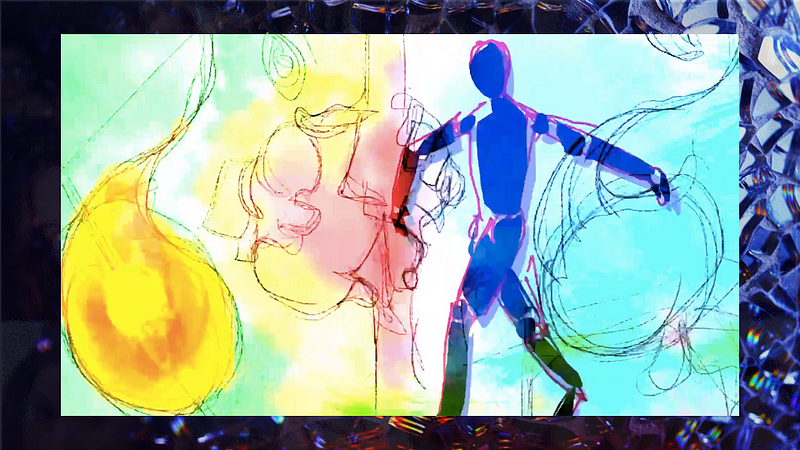
My father’s voice shaking with the palpable wetness of his tears, he murmured the words that betrayed how much pain he’s still in from the memories of what he did to the women in his family.
Hell, to the men, too. They just carry that sickness in different ways.
“I need to forget,” he whispered.
“What?” I said, even though I’d heard him clearly.
“There’s no reason I should have done that.”
“But you remember doing it?”
When the man I used to call my father said he looked forward to talking to me again, I told him that was never going to happen.
He said that was okay. “Family means familiar,” he said. “And you’ll always be family-iar.”
“I’m not,” I said. “I’m not your family. I never was, and I never will be.”
His tone shifted as quickly as when he’d admitted just how much he remembered.
“Fine,” he said.
“Good luck,” I said, just as unprepared to say goodbye.
“I don’t need luck.”
The line went dead.
How to Define Family vs Familiar
My need to remember is as stubborn as my dad’s need to forget.
For him, those memories are water under the bridge. Maybe once upon a time, he stood on the bridge and watched them pass by. Now he looks up at the sky. The water lightly echoes as it breaks over the rocks, almost like the sound of a young trans girl pleading for her father to meet her for once on terms other than his own.
The sound, like the sight, is too much for him. He turns away from both and walks off.
If he won’t go down there, I’ll have to go myself.

When I walk among the rocks and dirt and water, the stuff eventually turns into sand and surf.
I used to worry going to that part of the beach — that part of my memories — was dangerous. It’s where my parents take up the most space.
But this time, I will keep walking no matter what or who I find.
Everyone has to find the path out of their prison.
It’s different for each person.
I found my path within twelve-step programs. First with a generous AA sponsor who worked the ACA steps with me as best they could, then actual Adult Children of Alcoholics sponsors, and now a new circle in the fellowship of Co-dependents Anonymous/CODA.
Those programs taught me to recognize the truth within me.
The truth within me is this.
My sick family corrupted my thinking.
I don’t just mean my mom and dad. I also mean the chosen family I brought into my life, too. The ones I thought were empowering me but were actually trapping me in an even worse cycle of abuse.
As kids, we can’t escape that cycle. It’s all we know. We have no choice but to relate to the world around us. I hoped to make that world better, not to escape it entirely.
That’s the newest truth CODA has given me.
Co-dependent people aren’t always addicted to the same drug, but we are addicted to helping each other get our next fix. Empowering the other person empowers ourselves. It’s a vicious cycle that feels right, healthy, and sustainable.
But not all drugs look like flowers, powders, or cocktails. Emotion can be just as powerful a drug. For some people, that’s the entire reason they use heroin in the first place — to feel what they want to feel.
For some people, what feels healthy is the exact thing keeping them in their prison.
On occasion, I called my prison romance. But romance isn’t the sickness. I chose addicts as partners.
Most often, I called that sickness my brother. But he’s not the sickness. He’s as much a victim as I was.
Other times, I called that sickness my sister. But she’s not the sickness. She didn’t ask to be hurt like that, either.
The abuse the three of us suffered as kids was beyond our control. Is the healing the three of us have yet to find any different?
How to Stop Hating
It’s hard to forgive someone when you hate them.
It’s even harder when you love them.
I guess grief really is an illness that has to heal in stages. Transition taught me that. Just put in the work. Enjoy the process. The results will be what they will be.
But in the meantime?
My heart yearns for the people who hurt me. Those are the people who feel most familiar. Those are the people good medicine keeps me from indulging.
Those are the people from my family that I’ve written about at least once or twice (or a hundred times).
Those are the people I keep yearning for as surely as an addict yearns for a familiar hit long after they turned sober.
Sometimes, I’m afraid those people are coming for me.
But more often, I’m not afraid they’re coming for me.
Most often, I’m afraid they never will. Not after what I did.
How to Face What You Did
One by one, I disconnected from my family.
One by one, my family disconnected from me.
I told the secrets my family’s frantic abuse covered up since I was a kid. We all went through it. They were the perpetrators, but they didn’t start that way. They were victims, too.
I try to remind myself about that every time my hate for them bubbles up or bursts to the surface.
Every time I uncover a new memory, a new photograph, or a new email refreshing horrifying details of their abuse.
Every time I reconnect with a friend from those youngest years who remembers, who understands, who empathizes with what it was like to be surrounded by people who were eager to normalize pedophilia, grooming, and sexual assault.
Every time I meet someone today who doesn’t see a problem with what they did or what they’re still doing.
Every time I feel that hate, I remind myself that perpetrators aren’t born that way.
The dysfunction me and my siblings grew up with dug its claws into us so deeply, we forgot what it was like not to carry that burden.
When each monster gave us a brief absence, we felt a phantom pain so persistent that the claws may as well still be sunk into our skin.
We took on behaviors that helped us survive the best way we knew how.
We became the person who thrived with the pain and from the pain.
We integrated survival traits so deeply into our souls that we forgot what it was like not to carry that burden.
We taught others how to survive as we once had.
We unknowingly became the very perpetrators of the cycle we were once pulled into and have ever since dreamed of having enough power to escape.
How to Find Grace for What Remains
Grant me the serenity to accept the people I can change, the courage to change the people I can, and the wisdom to know the only person I can change is ME.
That’s a paraphrased version of the ACA prayer. It’s just a little different than the AA Serenity Prayer.
When I found recovery in twelve-step programs, I found that I could show up for myself in the ways I’d forever longed someone else would.
I learned that making my happiness depend on someone else’s wasn’t empathy and compassion. It was the definition of co-dependence.
I learned that my mission to fix my family was as much about me trying to find my fix, too.
I learned that happiness can’t be defined by whether an addict has enough of what they need.
I learned that an addict never has enough. That’s true when the addict is another person — but also when it’s just me, a different kind of addict, the kind who was addicted to trying to be the one who could satisfy the insatiable.
I learned that chasing that kind of happiness would either kill me or turn me into a different kind of abuser. Hurt people hurt people, you know. Victims of abuse are no different.
I learned that as much as that chase used to wake me up with purpose, ambition, and the certainty that there was at least one person in this world I loved enough to give up everything for if only it would make them whole, that the way forward to healing and wholeness must always make room for me too.
I learned that if I can get better, so can the rest of my family.
I learned that even if they don’t, I’ll still be okay.
I learned that if there is hope, there is forgiveness. And now that I have hope, I can hold strong to the other one, too.
I learned that memory can be a lot of things. It can be fickle. It can be weird. It can be a prison. I felt lost inside mine. Trapped by my own confusion and inability to simply walk around and find the way out.
But here I am — all thirteen of us.
How to Send A Letter to the Past

Dear Sharon,
I don’t know if you’ll ever see this. I just wanted to put this out there. I just wanted to tell you I finally got out.
And I don’t just mean I got out in the way I wanted. I got out in the way you hoped would one day happen for me.
I understand why I was sick. I understand what kept me in the same prison as the rest of my family.
Thank you for everything you did to help me.
I finally found the family that makes me feel like I’m home ❤
How to End the Story
Portions of this memoir-ella were previously published in the memoir anthology From 5 to 40: My Life in Photos
A few things to leave clear:
My diagnosis is Dissociative Identity Disorder. The subcategory is Tertiary Structural Disorder, in which “I” am composed of Apparently Normal Parts (ANPs) and Emotional Parts (EPs).
While other forms of DID involve a Primary identity who negotiates control of their body with secondary and tertiary identities, we are all thirteen equally valid parts. I am not the Primary.
My name, ironically, is Prime. But that’s just the name of the person you’re talking to right now— most of the time you’re not talking to me. I’m just one of thirteen people who share different parts of our body, memories, and experiences.
Michael was a real person, but in order to never be alone, we internalized a reflection of their kindness into a protective identity named Michelle.
All thirteen of us are: Daisy, Cookie, Zoe, Winnie, Prime, Connie, Memory, Ace, Kameron, Marcie, Page, Michelle, Aries
You can say hello to any of us in particular, but for our safety, most of us won’t often be able to respond
We stayed in three main hospitals:
For further reading about those hospitals, please check out:
History of Mississippi Psychiatry: A Dark Past Unearthed on UMMC Grounds
Exhuming a dark past: Mississippi State Lunatic Asylum’s 7,000 coffins | Washington Post
A Body a Day: Constructing Deviance at the Mississippi State Asylum | Master’s Thesis by Rachel Christine Childs, University of Mississippi
Former Whitfield hospital policeman arrested for fraud, extradited from Texas | WLBT
History of the Mississippi State Insane Hospital | Asylum Hill Project
Doing Less With Less: Mental Health Care in Mississippi | ProRepublica
Millcreek Employee Arrested | Magee News
Keys v. Rehabilitation Centers, Inc. | Legal briefing at Justia
The city left behind in Mississippi’s welfare scandal | Andscape
For further viewing, here are a few movies and documentaries about life inside (and outside) mental health facilities and the experience of having DID:
Without Consent
Out of Sight, Out of Mind
Of Two Minds
Girl, Interrupted
Identity
Shutter Island
Split/Glass
Daniel Isn’t Real
Star Wars: Darth Vader
Fight Club
Psycho
The Incredible Hulk
The MCU: Moon Knight
The Flash (CW): Caitlin Snow/Killer Frost/Khione
For two more people besides me with DID, check out these two YouTube channels:
For further reading on DID, check out:
Top 10 Dissociative Identity Disorder/Multiple Personality Movies
Scientists Have Developed a New Explanation for Consciousness

If you like my work and want to support it, send me a tip or become a subscriber for Queer History on Patreon, Medium, YouTube, or Substack





